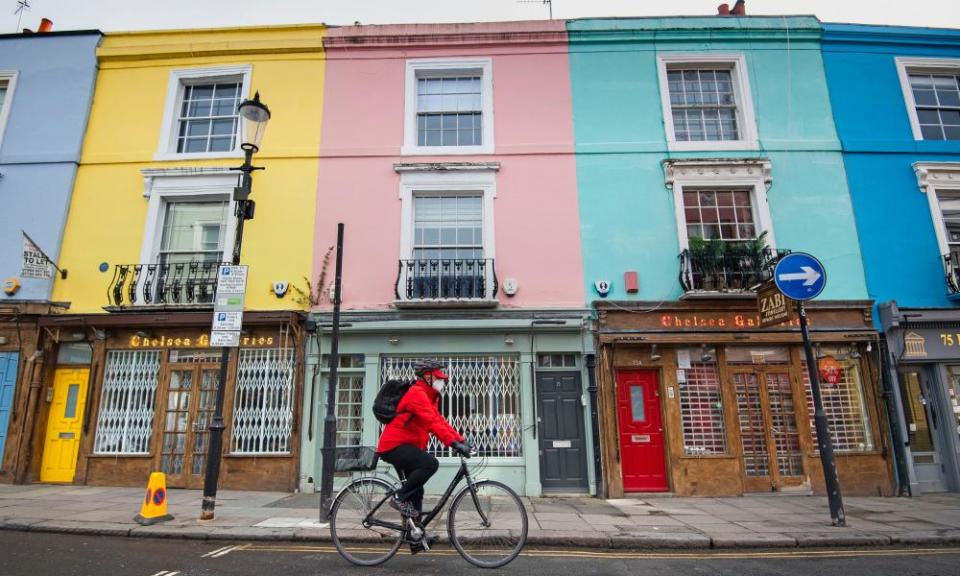Pedal power: UK bike co-ops help cyclists get back in the saddle
If you’re desperate to resume cycling but missed out on the first tranche of the government’s £50 repair vouchers, a local bike co-operative may be able to help you get back on the road.
Or, if during a lockdown clear out you unearthed a long-forgotten no-longer-needed bike, you could donate it to a project that will restore it and pass it on to someone else.
As traditional bike shops have struggled recently to meet the demand for bikes and parts, co-ops have started to come into their own.
Related: Bike theft: how to stay safe as UK cycle sales soar
The fact that they typically upcycle used bikes, often using parts stripped from older donated models, makes them perfect for these times.
If you live in an urban area, chances are there’s a bike co-op near you. Some larger cities, such as Bristol, even boast more than one.
While the model differs slightly around the country, in most cases they are run by a few paid staff, sometimes aided by volunteers – all passionate about helping more people to start cycling, and keeping others on the road.
Some are charities, others are social enterprises. Most offer classes in mechanics – some women-only – and some others run courses to help with road awareness. They often provide subsidised bikes for those who can’t afford the full cost.
DIY workshops
The Dr Bike project near the University of East Anglia in Norwich is typical in that, in normal times, it offers drop-in workshops where cyclists can use the centre’s tools, and get some often-needed help/advice from the on-hand mechanics. It also offers a conventional paid-for repairs service and sells refurbished bikes for substantially less then you’d pay for a new model.
“We started out as a conventional bike shop but became a co-op in 2013 to serve both the students attending UEA, but also the wider Norwich community,” says Dr Bike’s newest trainee, Charlie Smith. “Although Covid’s impacted on what we can currently offer, we have been helping NHS workers with free servicing, and keeping other workers on the move.
“We are the very opposite of those who try to hide the tricks of the cycling trade – our aim to make it as accessible as we can.”

As with most bike co-ops, Smith says, they have been forced to close their DIY workshop temporarily, but have seen donations increase during lockdown, including one gift of 36 bikes. The best ones will be restored, often using usable parts taken off those that are not worth saving.
Sam Chappell, who is one of those behind the Broken Spoke bike co-op in Oxford, says the sector is perfectly placed to help drive the renewed interest in cycling – if it can survive the next few months. Broken Spokes provided 30 free bikes to key workers during lockdown, as part of a national initiative, and hopes to get back to running all of its normal services as soon as possible.
Bikes are donated by local people, with the final few repairs done by the recipient with guidance from a mechanic
“Bike co-ops, like everyone else, have been hit hard by the lockdown as they were mostly ineligible for government loans,” he says. However, like Dr Bike, it has seen a big increase in donations since lockdown started to ease. And Chappell says co-ops are worthy of support: “Projects like ours are often at the very heart of the community and buying a refurbished bike from someone like us is not only one of the greenest ways to get around, it helps keep projects like ours going.”
One of the best known bike co-ops, the Bristol Bike Project, takes the concept one stage further, with its long-running “earn-a-bike” scheme. This has given free bikes to those in the greatest need, including refugees and the homeless.
Bikes are donated by local people with the final few repairs done by the recipient with guidance from a mechanic.
Ethical Consumer magazine, which has promoted the purchase of refurbished bikes over new models, has produced a list of co-ops around the country, although it is by no means exhaustive (search its website for “bike kitchens”). Google and local community forums should help find one in your area.
Repair voucher scheme
If you are in a position to pay for repairs, your local co-op could almost certainly use the business.
Some are registered to take the £50 vouchers from the government’s Fix Your Bike scheme. Demand for the first 50,000 was so high that the Energy Saving Trust’s website, which is processing applications, crashed on the launch night.
The government has said the next batch will be issued once it is satisfied that the stores and co-ops that have signed up, can meet demand. A total of 500,00 will be issued in 10 batches. The scheme is limited to two per household, and only runs in England. Consumers have to pay any additional costs if the work costs more than £50, which may well be the case for all but the simplest repairs.

 Yahoo Finance
Yahoo Finance 